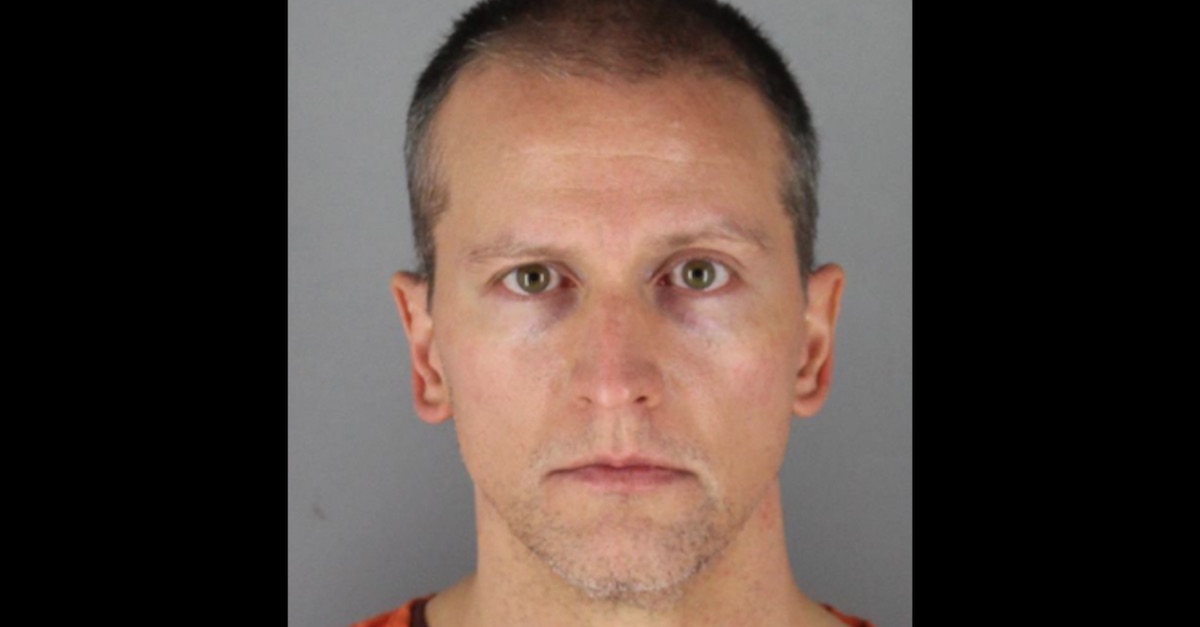
Derek Chauvin
All told, the defense teams in the death of George Floyd faced a net loss when a court largely denied their motions to dismiss the criminal cases against four former Minnesota police officers. Nonetheless, the attorney for lead defendant Derek Chauvin managed to get one of the lower charges knocked off. Bob Bianchi, a Law&Crime Network host and former prosecutor in Morris County, New Jersey, argued that this was a “stunning blow” to the state.
Stunning blow to prosecutors. They have to appeal. I’ll explain at 12pm on @LawCrimeNetwork #georgeflyod #derickchauvin https://t.co/DYNXBQKFt8
— Bob Bianchi TV Host; Head NJ Co. Prosecutor/DA frm (@RBianchiEsq) October 22, 2020
In an opinion dated Wednesday night, Judge Peter A. Cahill denied motions to dismiss the case against co-defendants Tou Thao, Thomas Lane, and J. Alexander Kueng. The most serious charge against Chauvin–second-degree murder with an underlying count of a third-degree assault–remains in place. So does second-degree manslaughter.
The court, however, said that there lacked probable cause for third-degree murder, the charge that was just between second-degree murder and manslaughter in severity. Cahill said that under the case law, it was determined that third-degree murder cannot occur when the defendant’s actions were focused on a particular person.
“The Court’s research has not disclosed any published Minnesota Supreme Court or Court of Appeals opinions affirming third-degree murder convictions in cases presenting analogous fact patterns to that presented here, in which the defendant’s allegedly criminal conduct was directed at and specificially focused on a single victim and where that defendant’s conduct did not present a risk of harm to others,” he wrote.
As recorded on video seen around the world, Chauvin kneeled on George Floyd’s neck for several minutes during an arrest. Lane and Kueug restrained Floyd’s back, while Thao stood between them. Bystanders voiced outrage over how the officers were treating Floyd. Floyd eventually became unresponsive. His limp body was carried into an ambulance. All four officers were fired over the incident; they are fighting the charges.
“The court may grant a motion to dismiss for lack of probable cause only if the facts appearing in the record together with all inferences drawn therefrom would not ‘present a fact question for the jury’s determination on each element of the crime charged,'” the court wrote, citing case law.
As suggested in the facts of the case, Chauvin’s actions were directed toward one person in particular: Floyd.
Bianchi argued in a Thursday episode of Law&Crime Report that was a big loss for the prosecution. He suggested that under the definition of the law, it might be a tall order for prosecutors to win a conviction for second-degree murder. If the state fails that at trial, then they would not have the third-degree murder charge to fall back on, but only manslaughter.
Third-degree murder in Minnesota is punishable by up to 25 years in prison. Second-degree manslaughter is punishable by up to 10.
As stated in the opinion, the state would have to prove Chauvin was guilty of third-degree assault to support to second-degree murder charge. To do that, they would in part have to prove that Chauvin assaulted Floyd either in “the intentional infliction of or the attempt to inflict bodily harm,” or “an act done with intent to cause [Floyd] to fear immediate bodily harm or death.” Manslaughter, on the other hand, would involve Chauvin demonstrably creating “an unreasonable risk and consciously took a chance of causing death or great bodily harm.”
[Hennepin County Jail]